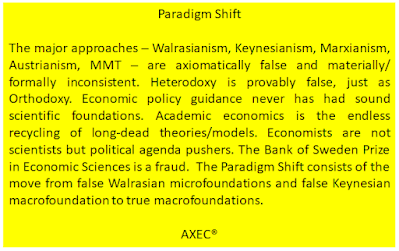Blog-Reference and Blog-Reference on Oct 12, 2018, adapted to context
“The goal in starting this discussion is to ensure that economics is a science that makes progress toward truth.” (See intro)
Reassuring declarations like this appear regularly when economics is in crisis, and they have regularly been counterproductive.
“The claim to the scientific nature of economics is prey to suspicion the moment that it fails to be self-evident.” (Benetti and Cartelier, 1997, p. 211)
What is, in fact, self-evident is that economics is a failed science. And this is not as recent as the onslaught of some mathematical extremists, but at least as the beginning of Neoclassics itself.
One curious thing to notice is that the thread's title sends the reader in the wrong direction. The problem has never been that math has masqueraded as science. The real embarrassment has always been that economists have used math to masquerade as science.
However, what comes across is that something has gone badly wrong with the math. This, as has been suspected by so many for so many years, is apparently against the spirit and standards of science. And now it falls upon Paul Romer to save the economics world.
“The usual way to protect a scientific discussion from the factionalism of academic politics is to exclude people who opt out of the norms of science. The challenge lies in knowing how to identify them.” (See intro)
As matters stand now, some people, nice colleagues, have to be expelled from the temple of economics, but Romer is acting in the best interest of the whole profession.
“Economists have a collective stake in flushing mathiness out into the open.” (Romer, 2015, p. 90)
Why? What stake? How did the crown jewel of economics become something to be flushed? Let us speculate. Could this be a strategic withdrawal? Is the dispensable ‘bad’ mathematical freak sacrificed for the benefit of the ‘good’ realistic maximization-and-equilibrium kind of guy?
The Great Recession has now come back on economics itself. On closer inspection, a growing number of non-economists rate it quite realistically as what it is: good for entertainment but not up to the scientific task. The writing is on the wall, Soros spends millions on New Economic Thinking and students defect to Heterodoxy and pluralism.
Time to close ranks and make a sacrifice to calm the angry masses. Among the most popular points of critique, excessive math has always been at the top of the charts. And the likes of Lucas, McGrattan, Prescott, Moll et.al. (sorry, dear colleagues, (Romer, 2015, p. 92)) have simply gone over the top. Their economic absurdities are so drastic that even the representative economist, who swallows almost everything, cannot swallow this ‘lemon’ (Romer, 2015, p. 90). The New Classical Mathies have to be flushed to save the core of Orthodoxy.
This does not suffice. To ‘exclude people who opt out of the norms of science’, one must exclude the overwhelming majority of economists from economics. Why? Because they subscribe to the same fundamental methodological mistake/error/blunder.
“There is in economics, or at least among the overwhelming majority of its disciples, broad agreement as to what represents the corpus of their subject. This corpus revolves around the concept of maximizing behaviour, whether it be by the individual, firm or institution.” (Blaug, 1990, p. 209). See also (2014a)
This faulty behavioral axiom has produced numerous offspring: supply-demand-equilibrium, general equilibrium, marginal utility, well-behaved production functions, total income = value of output, total income = wages + profits, marginal product distribution, I=S, and others that fill the textbooks (2014b).
It is bizarre that economists, who after more than 200 years still cannot tell the difference between profit and income and have still not realized that utility and equilibrium and production functions are NONENTITIES like dancing angels on a pinpoint, suggest that there is a valid scientific core that is jeopardized by mathiness.
There is no such core; Paul Romer's fallback position is untenable. Scientific incompetence, not mathiness, is the problem of economics. ‘Progress toward truth’ is hindered by Paul Romer and the maximization-and-equilibrium kind of guys themselves. Nothing less than a Paradigm Shift will do.
Egmont Kakarot-Handtke
References
Benetti, C., and Cartelier, J. (1997). Economics as an Exact Science: The Persistence of a Badly Shared Conviction. In A. d’Autume and J. Cartelier (Eds.), Is Economics Becoming a Hard Science? 204–219. Cheltenham, Brookfield: Edward Elgar.
Blaug, M. (1990). Economic Theories, True or False? Aldershot, Brookfield: Edward Elgar.
Kakarot-Handtke, E. (2014a). Objective Principles of Economics. SSRN Working Paper Series, 2418851: 1–19. URL
Kakarot-Handtke, E. (2014b). The Three Fatal Mistakes of Yesterday Economics: Profit, I=S, Employment. SSRN Working Paper Series, 2489792: 1–13. URL
Romer, P. (2015). Mathiness in the Theory of Economic Growth. American Economic Review: Papers & Proceedings, 105(5): 89–93. DOI
***
AXEC106m
